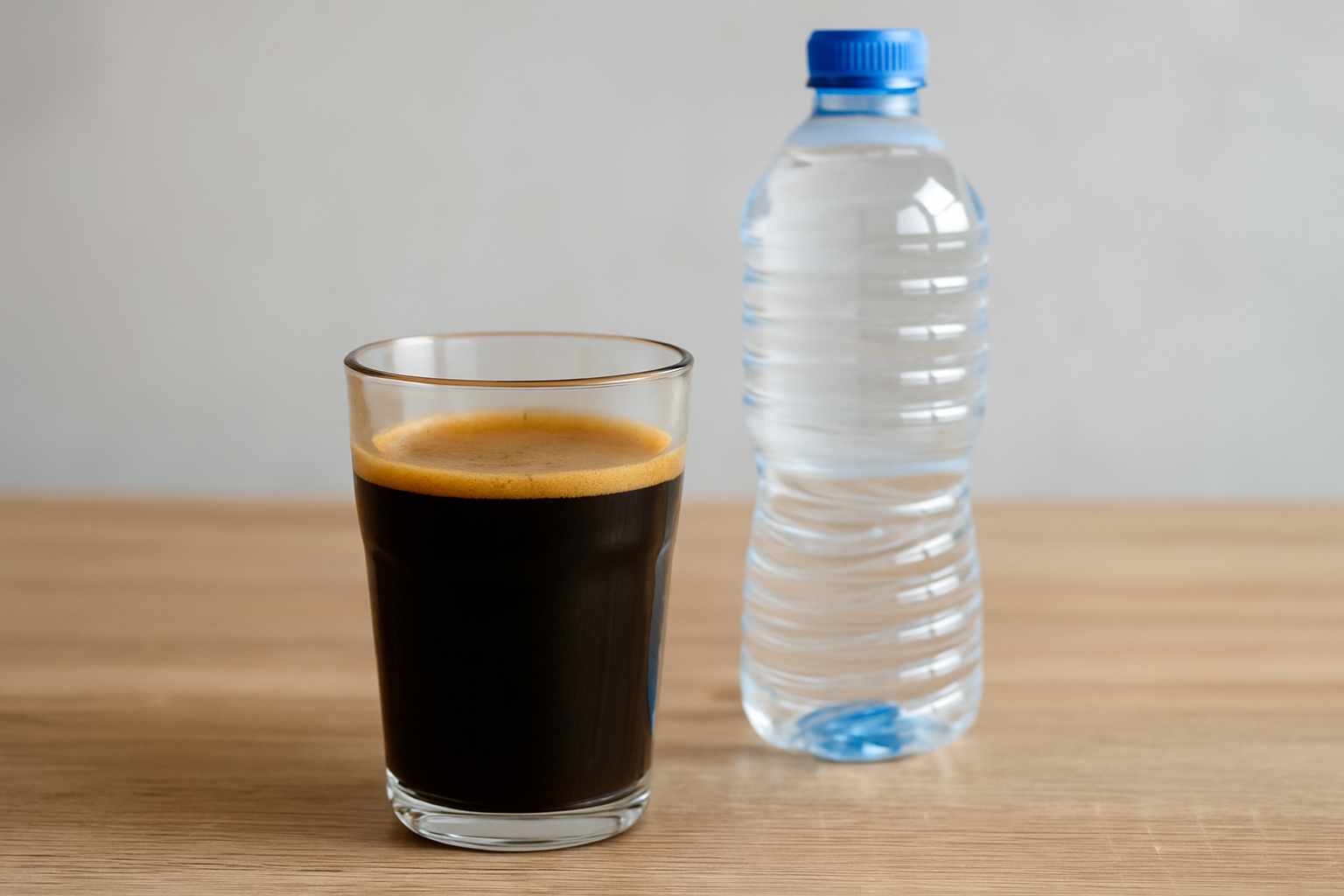Coffee is loved for its energizing properties, rich aroma, and comforting warmth—but it also comes with a lingering myth: that it causes dehydration.
For years, people have been told to “drink water to offset your coffee” or that “coffee doesn’t count toward your hydration goals.”
But is that really true? Does coffee dehydrate you, or can it actually be part of your daily fluid intake?
In this article, we’ll explore the science behind coffee and hydration, separate facts from myths, and show you how to enjoy coffee without compromising your body’s water balance.
Where the Dehydration Myth Began
The idea that coffee dehydrates the body stems from the fact that caffeine has mild diuretic effects. That means it can increase urination—especially when consumed in large amounts.
This led many people to believe that coffee pulls water out of the body and therefore can’t be counted toward daily hydration.
But recent studies have shown that this assumption is outdated and oversimplified. In reality, moderate coffee consumption does not cause dehydration—and may even help you stay hydrated throughout the day.
Coffee Is Mostly Water
The first key point: brewed coffee is made of over 98% water. So when you drink a cup of coffee, you’re not just ingesting caffeine—you’re consuming fluid.
Even though caffeine has some diuretic properties, the large amount of water in coffee more than offsets that effect for most people.
Unless you’re drinking extreme quantities or are very sensitive to caffeine, coffee does not lead to net water loss. In fact, it contributes to your daily fluid intake.
What Science Says About Coffee and Hydration
Several studies have confirmed that drinking coffee—even several cups a day—does not lead to dehydration in healthy individuals.
One notable study compared coffee drinkers to water drinkers over multiple days and found no significant difference in hydration status, electrolyte levels, or urine output when consumed in moderate amounts.
The conclusion? Coffee, in reasonable quantities, is as hydrating as water.
So yes, your morning cup of black coffee counts toward your daily hydration goals.
What Is “Moderate” Coffee Consumption?
For most people, moderate consumption means 2 to 4 cups of brewed coffee per day, or about 200 to 400 mg of caffeine.
This level supports energy, focus, and alertness without causing unwanted side effects like jitteriness, sleep disruption, or excessive urination.
Of course, individual tolerance varies. Some people are more sensitive to caffeine and may need to adjust accordingly.
If you notice increased thirst, dry mouth, or other signs of dehydration after drinking coffee, simply pair it with a glass of water.
Coffee and Electrolyte Balance
Electrolytes like sodium, potassium, and magnesium are vital for fluid balance and muscle function. Excessive fluid loss can lead to electrolyte imbalances, but coffee is unlikely to cause this on its own.
In fact, many quality coffees contain small amounts of potassium and magnesium. While not enough to replace an electrolyte drink, these minerals contribute positively to your intake.
If you’re sweating heavily, exercising intensely, or sick with a fever, focus more on overall hydration and electrolyte-rich fluids—but coffee isn’t the enemy.
Drinking Coffee Without Getting Dehydrated: Best Practices
Even though coffee contributes to your hydration, it’s still smart to build habits that support your body’s natural water needs.
Here’s how to enjoy coffee without risking dehydration:
1. Start Your Day With Water
Before your first cup of coffee, drink a full glass of water. This jump-starts your hydration after sleep and sets a healthy tone for the day.
2. Alternate With Water
If you drink multiple cups of coffee per day, try alternating with water or herbal tea. This keeps your fluid balance stable.
3. Sip Slowly
Chugging large amounts of coffee can overwhelm your system. Sipping slowly supports better absorption and helps you notice if you’re feeling thirsty.
4. Limit High-Caffeine Additions
Energy shots, strong cold brews, or triple espressos have concentrated caffeine levels. While fine in moderation, they may increase urination more than regular coffee.
5. Eat Hydrating Foods
Fruits, vegetables, soups, and smoothies all contribute to hydration. Coffee fits into this broader hydration picture.
Caffeine Sensitivity and Individual Response
While coffee is generally hydrating, it may affect people differently.
You may notice that coffee increases your need to urinate, especially if:
- You’re drinking it on an empty stomach
- You’re new to caffeine
- You consume high-caffeine brews (like cold brew or espresso shots)
- You drink it quickly rather than gradually
Pay attention to how your body responds and adjust your routine as needed. For most people, these effects are temporary and mild.
Coffee and Skin Hydration
A common concern is whether coffee dries out your skin. While hydration plays a role in skin appearance, coffee does not dry out your skin when consumed in normal amounts.
What matters more is your overall hydration from all sources—water, food, beverages, and lifestyle habits.
If you’re drinking enough fluids and caring for your skin externally, your daily coffee habit is unlikely to have any negative effect on skin moisture.
Can You Drink Coffee While Working Out?
Absolutely. Many people enjoy coffee before workouts for its performance benefits, and it won’t dehydrate you during physical activity—as long as you’re also drinking water.
If you sweat heavily or work out in the heat, bring water or a hydration drink with you. Coffee provides mental focus and energy, but water is essential for regulating temperature and replacing fluid loss.
In this context, coffee is a complement to hydration, not a substitute.
Is Decaf Better for Hydration?
Decaffeinated coffee contains all the water of regular coffee—but with minimal caffeine. This makes it an excellent option for those with caffeine sensitivity or those who want hydration without stimulation.
So if you’re looking to sip something warm and comforting in the evening, decaf coffee is a perfect choice—and yes, it still counts toward your hydration.
Coffee Isn’t the Problem—Lack of Water Is
The real hydration issue isn’t coffee. It’s the fact that many people simply don’t drink enough water throughout the day.
If you rely solely on caffeinated beverages, energy drinks, or sweetened drinks, your hydration may suffer—not because of the caffeine, but because water is missing.
Instead, let coffee be part of your fluid intake—not your only source.
Aim to drink water consistently through the day, especially when waking up, before meals, during exercise, and before bed.
Final Thoughts: Drink Your Coffee, Stay Hydrated
Coffee doesn’t deserve its bad reputation when it comes to hydration. In reality, it’s a fluid-rich beverage that contributes to your daily intake, supports energy, and brings joy to your routine.
So yes, you can drink coffee without getting dehydrated. Just be smart:
- Drink water alongside it
- Pay attention to your body
- Stick to moderate caffeine intake
- Eat water-rich foods
- Use coffee as part of—not in place of—a hydration strategy
Enjoy your brew. Stay energized. And drink to your health—with balance, awareness, and satisfaction in every cup.

Marcelo Oliveira is a coffee enthusiast and content creator specializing in barista skills, brewing methods, equipment reviews, coffee-related health insights, and fascinating curiosities from the coffee world. With a deep passion for every step of the brewing process, he turns technical knowledge into accessible and engaging content for both beginners and seasoned coffee lovers. Marcelo’s goal is to help readers appreciate the full experience of coffee—from bean to cup.
